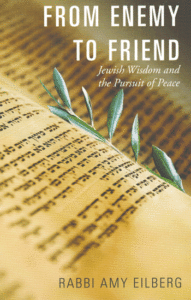From Enemy to Friend: Jewish Wisdom and the Pursuit of Peace, by Rabbi Amy Eilberg, 278 pages, Orbis Books, $25
Reviewed by NEAL GENDLER
Rabbi Amy Eilberg believes that “there is no way to real peace but the gradual process of opening hearts.”
She says: “Conflict thrives when minds are closed by histories of wounding, and resolution becomes possible when hearts and minds are open to the humanity of the other side.”
Her well-written From Enemy to Friend, rich with quotation from Jewish texts, “presents traditional Jewish concepts of peace and conflict as a spiritual practice that can guide the lives of faithful people seeking to contribute to a more peaceful world.”
Eilberg, of St. Paul, directs interfaith programs at the Jay Phillips Center for Interfaith Learning, a collaboration of St. Thomas and St. John’s universities. She also teaches at United Theological Seminary and St. Catherine University. And yes, she was the first woman ordained as a Conservative rabbi by the Jewish Theological Seminary,
Drawing on seven years of interreligious work, Eilberg says that a more peaceful world means moving beyond toleration to celebration of difference “as a fundamental gift of God’s creation,” and building relationships that take us “beyond generalized thinking about ‘the other.’” Jews must let go of “outmoded habits of suspicion.”

Eilberg is neither naïve about dangers to Israel nor proposing solutions to the Israel-Arab conflict. “Lacking the means to effect international peacemaking,” she says, “it is my work to help build peace right where I live, teaching people how to calm fear of the other in order to bridge isolating boundaries between communities.” She seeks “to reclaim the concept of peace as a centerpiece of Jewish theology, prayer and practice.”
And “Jewish tradition is in love with the subject of peace,” she says, showing its repeated appearance in prayer. The Torah’s command for kindness to the stranger appears 36 times — more than any other — testifying both to its importance, she says, and to its difficulty.
Conflict can be a creative force for solutions, she says, provided we can overcome our primitive “fight or flight” response. One must listen carefully, try to have an open mind, and try to see the opponent’s humanity. Conflicts are complex beyond their topics because of “the unspoken layers of emotion, personal values and identity that underlie the words.”
From Enemy to Friend provides techniques to help overcome “a primal fear of difference,” and the author describes successful programs that do so; especially heartening are those helping Israeli Jews and Palestinian Arabs create deep friendships.
Particularly engaging is the “Peace Among Jews” chapter, sorrowing over how congregations and even friends have split over Israel’s actions (as if they were ours to control). This damages the Jewish community, she says, citing instead the example of Hillel and Shammai, who disagreed about Jewish practice, but did so with non-divisive respect.
“We must do the rigorous work of challenging ourselves to distinguish between those views and positions that are truly illegitimate and those that are simply wrong from our own point of view,” she says.
Her “deepest purpose” in this book is to persuade readers to be peacemakers in their own lives, and she provides techniques for doing so, including overcoming fear of the other and of memories of humiliation often lying at the heart of interpersonal conflict.
Her writing about peacemaking between individuals exposes principles that also apply to Israel and the Arabs.
“It is one of the enduring puzzles of entrenched identity conflict that the pain over the harms committed by the other side comes to feel somehow gratifying, reinforcing self or group identity, and conviction of how right we are,” she says. “Anger at the other and holding fast to the list of legitimate grievances makes us feel strong and clear, when really we are imprisoned by traumatic memories.”
In troubled relationships, “reconciliation becomes possible when both sides gradually come to feel that mutual goodwill is more satisfying than holding on to feelings of hurt or anger, woundedness and betrayal.”
***
Neal Gendler is a Minneapolis writer and editor.
(American Jewish World, 6.20.14)



















